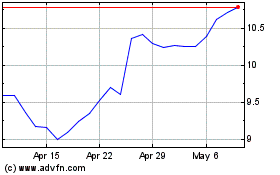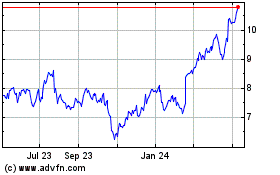Oil Prices Retreat From Highs
October 03 2016 - 12:50PM
Dow Jones News
Oil prices retreated after OPEC's production deal briefly sent
the market to its highest price since early July.
U.S. crude for November delivery recently lost 32 cents, or
0.7%, to $47.90 a barrel on the New York Mercantile Exchange.
Brent, the global benchmark, lost 29 cents, or 0.6%, to $49.90 a
barrel on ICE Futures Europe.
Traders and money managers have been buoyed by the prospect of
coordinated action to reduce output to between 32.5 million and 33
million barrels a day from the Organization of the Petroleum
Exporting Countries since the members' met in Algeria. However,
several market observers believe that the OPEC deal still has a way
to go before it delivers on its early promise.
New York-based Morgan Stanley said the risk of disappointment
over the deal is high, and that it is unclear whether the agreement
isn't just aimed at settling the nerves of a jittery market for
another couple of months. It added that more discussions were
needed, particularly with major non-OPEC producers such as Russia,
to ensure that positive sentiment won over the past week isn't
quickly lost.
With many now waiting to see how the deal plays out, day traders
who move based on charts and momentum have retaken hold of the
market, a trader and broker said. After nearly a week of sharp
rises for oil, gasoline and diesel futures, those technical traders
noted that the momentum had waned, said Ric Navy, senior vice
president for energy futures at brokerage R.J. O'Brien &
Associates LLC.
"We're stalling at the August highs," he added. "It says we
could correct lower."
Traders are also monitoring Hurricane Matthew and its threat to
oil facilities in the Gulf of Mexico. And U.S. stocks fell slightly
across the board to start Monday trading.
There are long-term concerns about OPEC, too. The U.K.'s
Barclays said that the deal meant expectations have now been raised
and any doubts as to the ability of OPEC to curb production offered
serious downside potential for prices over the coming weeks.
With so much resting on OPEC, other analysts were quick to damp
any overly enthusiastic price forecasts for the rest of 2016.
The London-based Energy Aspects said that short- to midterm
supply and demand fundamentals make it unlikely that prices will
rise beyond the $50-$55 a barrel bracket. The think tank also
warned that production cuts from the cartel were the only real
solution to a swifter rebalancing of the supply-demand
equilibrium.
"With non-OPEC supplies already falling by the wayside, there is
little rebalancing that can occur outside of OPEC," Energy Aspects
said in a note.
Meanwhile in the U.S., the oil rig count increased by seven rigs
to total 425 last week according to the oil-field services company
Baker Hughes, the 14th weekly increase in the last 15 weeks, though
the rise in activity has still not had any major impact on U.S.
production.
In refined product markets, gasoline futures were down 1.4% at
$1.4432 a gallon, and diesel futures were down 0.7% at $1.527 a
gallon.
Write to Kevin Baxter at Kevin.Baxter@wsj.com and Timothy Puko
at tim.puko@wsj.com
(END) Dow Jones Newswires
October 03, 2016 12:35 ET (16:35 GMT)
Copyright (c) 2016 Dow Jones & Company, Inc.
Barclays (NYSE:BCS)
Historical Stock Chart
From Mar 2024 to Apr 2024

Barclays (NYSE:BCS)
Historical Stock Chart
From Apr 2023 to Apr 2024
